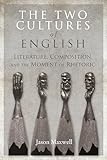The Two Cultures of English : Literature, Composition, and the Moment of Rhetoric / Jason Maxwell.
Material type: TextPublisher: New York, NY : Fordham University Press, [2019]Copyright date: ©2019Description: 1 online resource (256 p.)Content type:
TextPublisher: New York, NY : Fordham University Press, [2019]Copyright date: ©2019Description: 1 online resource (256 p.)Content type: - 9780823282463
- 9780823282487
- English language -- Rhetoric -- Study and teaching (Higher) -- Canada
- English language -- Rhetoric -- Study and teaching (Higher) -- United States
- English philology -- History -- 20th century
- English philology -- History -- 21st century
- English philology -- Study and teaching
- EDUCATION / Higher
- Composition
- English
- Institutional History
- Literary Criticism
- Rhetoric
- Theory
- Writing Studies
- 420 23
- PE51
- online - DeGruyter
- Issued also in print.
| Item type | Current library | Call number | URL | Status | Notes | Barcode | |
|---|---|---|---|---|---|---|---|
 eBook
eBook
|
Biblioteca "Angelicum" Pont. Univ. S.Tommaso d'Aquino Nuvola online | online - DeGruyter (Browse shelf(Opens below)) | Online access | Not for loan (Accesso limitato) | Accesso per gli utenti autorizzati / Access for authorized users | (dgr)9780823282487 |
Frontmatter -- Contents -- Introduction -- Chapter 1. On the Use and Abuse of Rhetoric in Composition and Theory -- Chapter 2. Between Standardization and Serialization: Kenneth Burke, Fredric Jameson, and Radical Criticism in the Post-Fordist Era -- Chapter 3. Mapping the Archival Turn in English Studies -- Chapter 4. Toward an Aesthetics without Literature -- Chapter 5. New Things, Old Things: Reading the Latourian Turn Symptomatically -- Coda: English Studies and the Uncertain Future -- Acknowledgments -- Notes -- Bibliography -- Index
restricted access online access with authorization star
http://purl.org/coar/access_right/c_16ec
The Two Cultures of English examines the academic discipline of English in the final decades of the twentieth century and the first years of the new millennium. During this period, longstanding organizational patterns within the discipline were disrupted. With the introduction of French theory into the American academy in the 1960s and 1970s, both literary studies and composition studies experienced a significant reorientation.The introduction of theory into English studies not only intensified existing tensions between those in literature and those in composition but also produced commonalities among colleagues that had not previously existed. As a result, the various fields within English began to share an increasing number of investments at the same time that institutional conflicts between them became more intense than ever before.Through careful reconsiderations of some of the key figures who shaped and were shaped by this new landscape-including Michel Foucault, Kenneth Burke, Paul de Man, Fredric Jameson, James Berlin, Susan Miller, John Guillory, and Bruno Latour-the book offers a more comprehensive map of the discipline than is usually understood from the perspective of either literature or composition alone.Possessing a clear view of the entire discipline is essential today as the contemporary corporate university pushes English studies to abandon its liberal arts tradition and embrace a more vocational curriculum. This book provides important conceptual tools for responding to and resisting in this environment.
Issued also in print.
Mode of access: Internet via World Wide Web.
In English.
Description based on online resource; title from PDF title page (publisher's Web site, viewed 02. Mrz 2022)


